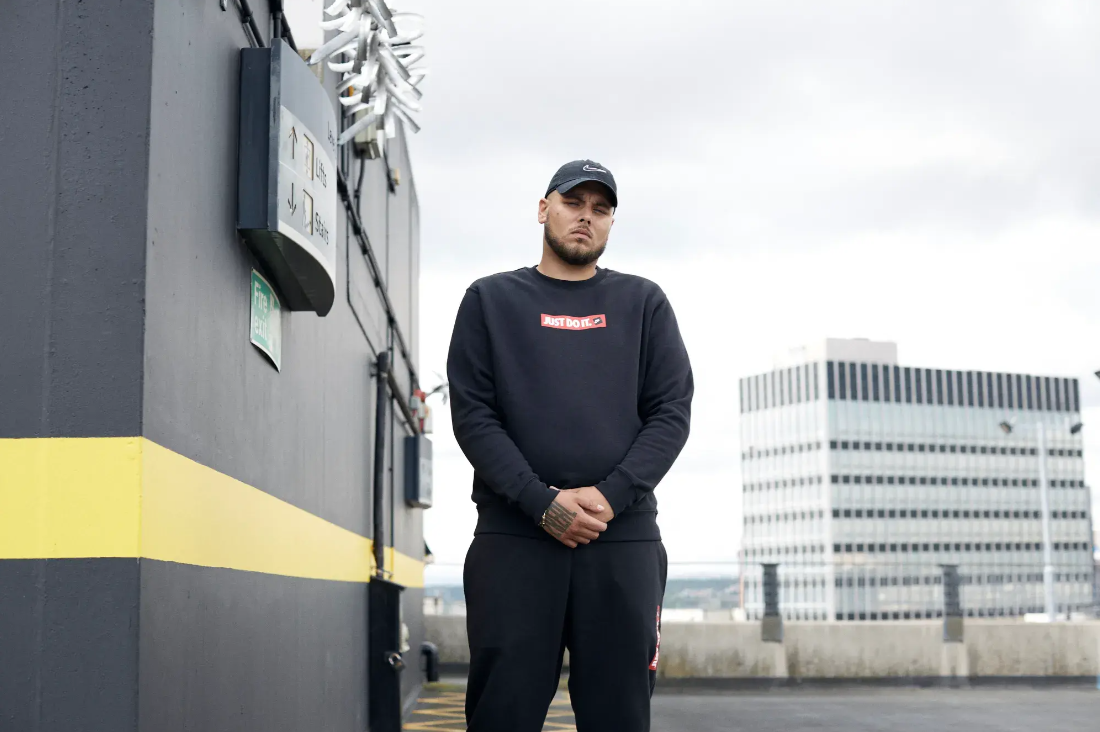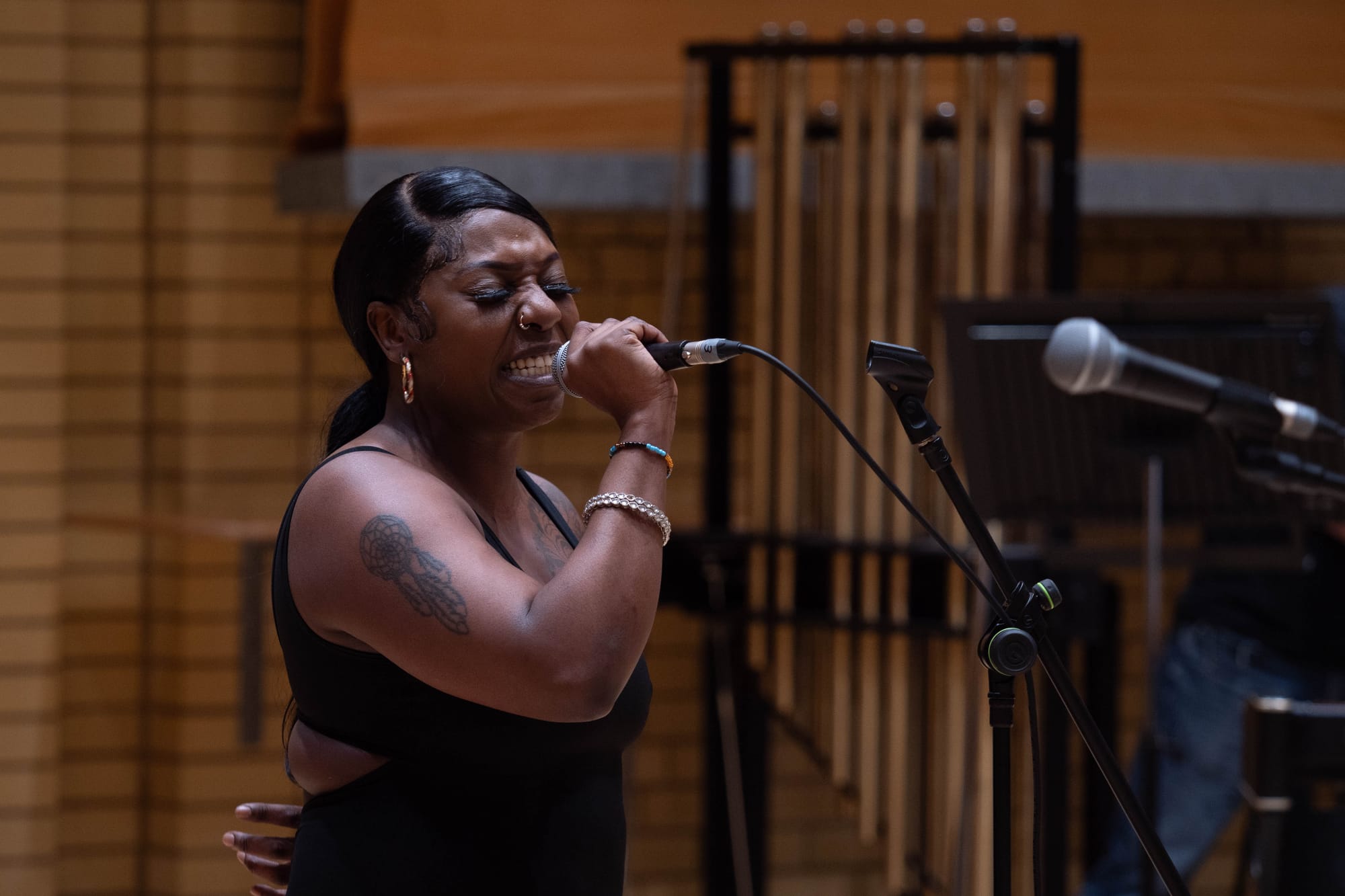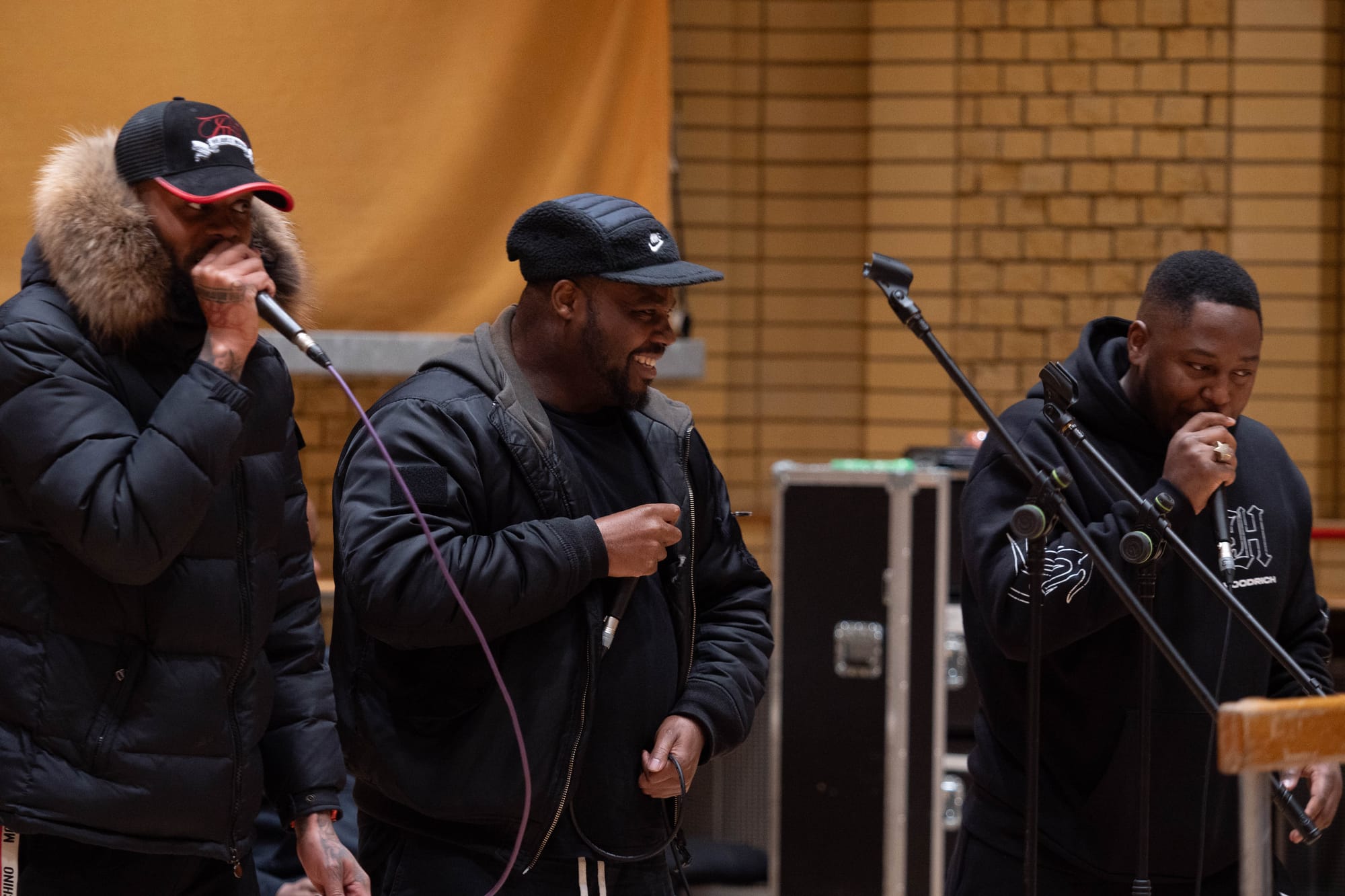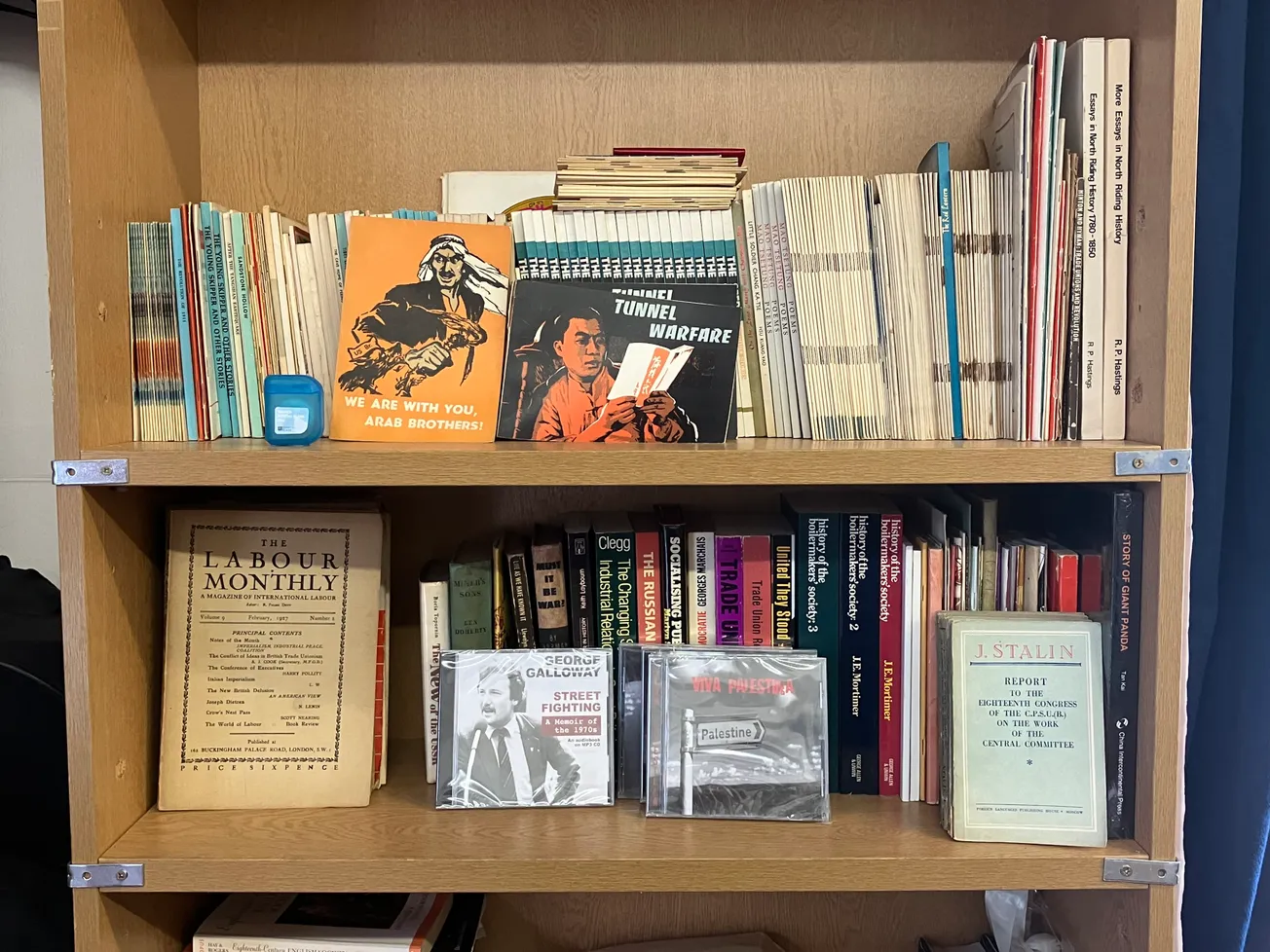In 2015, UK grime made an explosive return to the mainstream. Artists achieved global recognition and started climbing the charts. And as the year edged to a close, Birmingham MC, Lady Leshurr (government name: Melesha Katrina O'Garro), released the fourth part in a musical series cheekily titled ‘Queen’s Speech’. It cut through: by the next year, Leshurr’s distinctive Kingshurst vowels could be heard performing ‘Queen’s Speech 4’ everywhere from the BBC studios, to in front of thousands of Glastonbury revellers.
The day the video for ‘Queen’s Speech 4’ dropped — a no frills production filmed on a smartphone — a young woman called Lizzie excitedly texted her best friend, Tom. “Oh my god” she wrote. “You have to make this work with an orchestra one day!” Ten years on, and Tom Spurgin, now creative director of learning and engagement at the City of Birmingham Symphony Orchestra (CBSO), is doing just that. Lady Leshurr and 15 other grime artists and groups will make history performing alongside the city’s 75 piece orchestra this evening. The event is titled ‘LEGACY,’; Lizzie has a VIP ticket to the show.
LEGACY is a meeting of minds. It comes off the back of a larger project, spearheaded by local creative development agency Punch Records, that includes a documentary film and a book. The goal is to firmly put Birmingham’s underground music history — so often pushed into the shadows of London’s limelight — on record. And at the same time Punch were thinking about how this music and the people who made it, had been uniquely shaped by the city, across town, the team at CBSO were grappling with the same question. “[The film] is just so deeply embedded in Birmingham, it was entirely about artists that have been brought up here,” says Spurgin. “And that's what we're looking at as an orchestra, what it means to be Birmingham's orchestra at the moment."

It wasn’t the easiest question to answer. Sure, Birmingham has this amazing classical orchestra with a rich history — it’s the UK's first civically funded orchestra — but in 2025, what connection does it maintain with the people who make Brum a distinctive place to be?
"What we probably haven't been doing well enough over the last 30 years," Spurgin confesses, “is connecting to a wider range of people in Birmingham." Various factors have only heightened barriers to Western classical music for those belonging to ethnic minority and low income demographics. Birmingham is one of the most ethnically diverse cities in the UK. So, says Spurgin, the team at CBSO said, ok: "we need to make an active intervention in this and connect with those communities."
We’ve written about CBSO’s attempts to modernise before — CEO Emma Stenning has faced criticism from traditionalists for bringing in measures designed to broaden appeal, like allowing drinks into the concert hall and phone use during certain shows. But despite all this, it was actually Stenning who was summoned for an audience with the rappers first, not the other way around.
The invitation came from Ammo Talwar, CEO of Punch Records. The agency — which emerged from Talwar’s Perry Barr-based record shop of the same name — exists to support artists to build sustainable creative careers, especially if they work outside of the mainstream.

In 2023, the Punch crew were celebrating at Millennium Point. Spirits were high; their agency-produced documentary LEGACY, which dug into the city’s contributions to grime, rap and hip-hop, had just premiered. Talwar, aware that Emma Stenning was on a mission to broaden the CBSO’s horizons, and always keen to make connections between his Punch people and other creatives in the city, asked her and her team to come along to the party. However, they didn’t get the VIP treatment.
"I didn’t really want to molly-coddle them, so I just left them to get on with it," he says, recalling the evening. "It’s too easy sometimes for senior people to [be handheld in environments they’re not used to] but they were just really open. They loved it more than some of the grime artists to be fair." He says the relationship between the two parties then developed organically, but evidently, there was some initial wariness. When CBSO first floated the idea of working with the grime acts, a few of them were a little sceptical, thinking it was too little, too late, Tom Spurgin remembers: "Some of the artists probably came in going, ‘here's a large organisation that wants to connect with us. Why might that be?’" Others had to pitch on CBSO’s behalf. "One of the artists said, ‘look, this is an invitation’," says Spurgin. "‘Maybe the organisation should have done it 20, 30 years ago, but let's take this opportunity now to connect, because something really cool could come from this’".
Deadly, an MC and producer from the grime crew NODB was one of those on board from the get go; he saw it as the natural continuation of ongoing work. "[The documentary shows] where we came from and [the CBSO collab shows] where we’ve come to," he says. From his perspective, the mashing of the two different genres also isn’t as unexpected as it might seem. "A lot of classical pieces are at a tempo of around 70 bpm or 140 bpm," he says — just like grime and bassline. “In NODB, we use strings, flutes and operatic vocals in our music, it’s just that we turn it into our thing, the way we want to hear it."
That said, I want to know how the ensemble, in the vast, 2,262 seat Symphony Hall will be able to bring the same energy you’d get in a grime clash, the distinctive lyrical battle between MCs that’s fast-paced, up-close-and-personal. The main difficulty is timing. "There’s a swing and a flow of the beat and if it's not bang on time it'll crash," Chanda Chisanga, better known as C4, tells me.

A grime MC and producer, he’s been a mainstay in the Birmingham scene since his first single ‘Detention’ was released 16 years ago, the video for which he filmed at his old secondary school in Aston. As a regular collaborator with Birmingham Royal Conservatoire, C4 is familiar with some of the challenges of merging the two forms of music. Aside from energy, the other obstacle is replicating electronic sounds with acoustic instruments. “You can't authentically recreate a reload,” he says. “It’s not the same, it's a bit more polished. But it’s an interesting listen and I think a lot of people appreciate it.”
A reload — also known as a wheel up, or pull up — is another key ingredient of any good clash. The practice comes from Jamaican sound system culture, where the DJ will pull back the record as it's spinning to restart the track or repeat an especially good moment partway through, usually in response to the crowd’s energy. In clashes, a wheel up is a badge of honour: it means the MC's timing is on point and the audience is enjoying their lyrics, their appreciation expressed in shouts of encouragement or with gunfingers (exactly what it sounds like, fingers held in the air as if shooting a gun) aloft. It means they want more.
“One of the biggest challenges is doing a wheelie,” CBSO conductor Phil Meadows confirms. But, “we can’t do an hour and a half of grime and not have a moment where that happens.” He’s the man tasked with translating the grime artists’ tracks into music that the 75-instrument orchestra can play, which involved the painstaking process of transcribing the musical notes by hand as he listened. It’s not a new experience for him, however. His specialty is bringing together cross-genre artists including orchestral collaborations with the Netherlands' leading hip-hop platform 101Barz and another with Scottish band Texas.

For the Birmingham show, this involved making sure the classical musicians were up to speed on their hip hop history. Meadows set CBSO members a musical crash course, easing them in with “gateway” artists like J Dilla and Mf Doom first, before they worked their way up to the heavy bass and breakneck rhymes of performers like Birmingham’s Big Dog Yogo. Contrary to what various movies might condition you to expect, there haven’t been any personality clashes (just lyrical ones).
Nice as this is, the fact is that this same enthusiasm needs to be replicated at the box office, not just in terms of ticket sales but who is buying them. The CBSO’s future is uncertain, amid declining audience numbers. When I chatted with Emma Stenning last summer, she was positive about the challenge ahead but spoke plainly about needing to reverse that trend. “I’ve spent my whole career modernising arts organisations to bring the work to new audiences,” she told me then. With that in mind, she and Spurgin set themselves a target that 75 per cent of LEGACY ticket sales would go to people who have not booked in for a CBSO show before. After working closely with Punch to bring their audiences on board, when we speak at the start of the week, Spurgin reveals they are on track to hit their goal — and they’re almost sold out.
If they pull it off it will be quite an achievement, especially given the seed of the idea was planted a decade ago, when Lizzie texted her best mate about Lady Leshurr’s new track. Spurgin says the gravity of the moment hit home at a recent rehearsal, when he was listening to the trombones warm up for a RoxXxan, ‘Rock the Mic’ freestyle track. “Oh my God, it's actually happening,” he thought to himself. “We're doing this.”
As for the MCs, the respect is mutual. This is key because, in the wrong hands, the project could come off as little more than a gimmick rather than two distinctly Birmingham scenes connecting to make something fresh. “I think it’s sick, I like it,” says C4. “It’s like two worlds coming together and I think it should happen more because we are all there for the same reason: we love music.”








Comments